My Life as a Mankiewicz (32 page)
Read My Life as a Mankiewicz Online
Authors: Tom Mankiewicz
Jack Haley Jr. and Tom, 1980s (courtesy Nate Cutler)
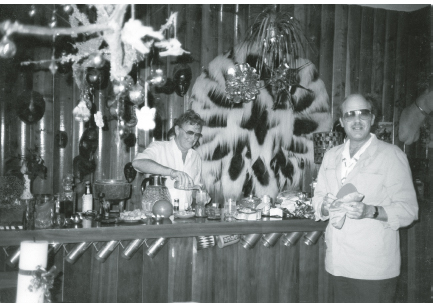
Don Hunt and Tom, Kenya Game Ranch Club, Kenya, 1985
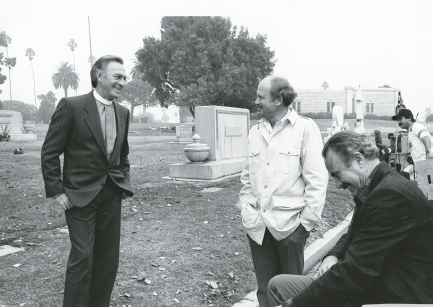
Christopher Plummer, Tom, and Dabney Coleman on the set of
Dragnet
, 1986 (courtesy Universal City Studios, Inc.)
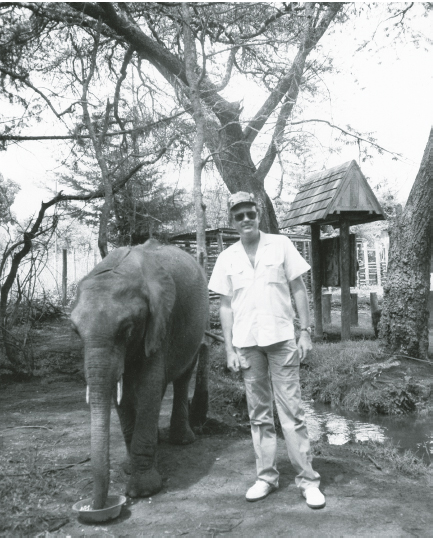
Tom and friend, Kenya Game Ranch, Kenya, 1985
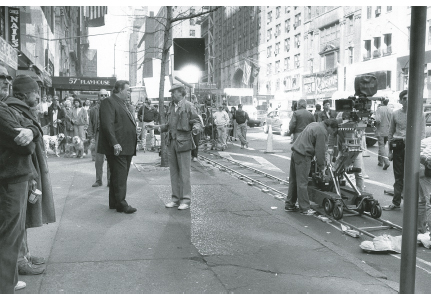
John Candy and Tom on the set of
Delirious
, New York City, 1990 (courtesy MGM/UA)
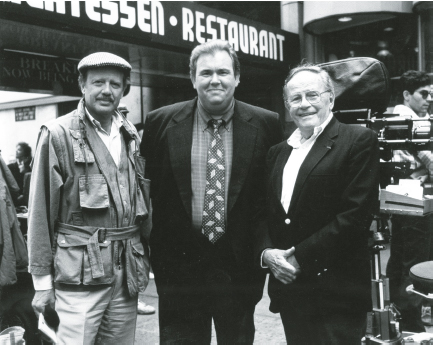
Tom, John Candy, and Joe L. Mankiewicz on the set of
Delirious
, West Fifty-Seventh Street, New York City, 1990 (courtesy MGM/UA)
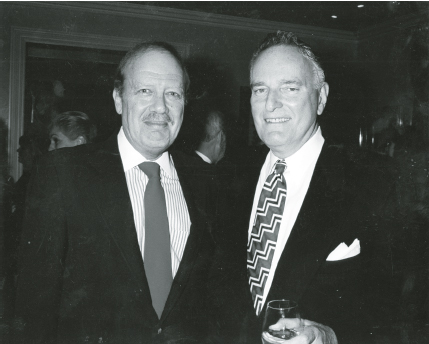
Tom and Jerry Moss, 1990s
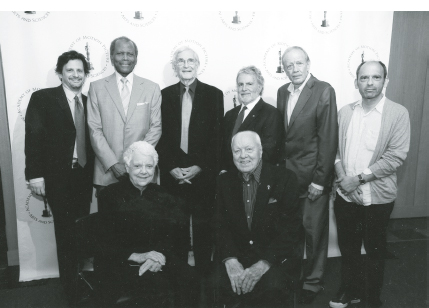
Ben Mankiewicz, Sidney Poitier, Martin Landau, Sid Ganis, Tom, John Mankiewicz, and (bottom left) Rosemary Mankiewicz, C. O. “Doc” Erickson, Academy of Motion Picture Arts and Sciences tribute to Joe Mankiewicz, Beverly Hills, California, 2009 (courtesy AMPAS)
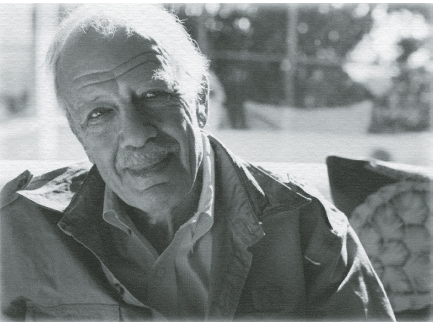
Tom at sixty-eight, 2010
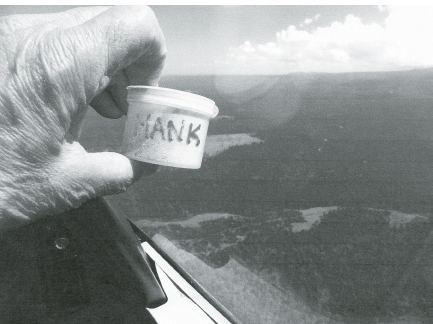
Tom's ashes, over Kenya Game Ranch, Kenya, 2010 (courtesy Ron Mardigian)
My cousin Ben, who is the weekend host on Turner Classic Movies, ran
The Eagle Has Landed
once. He asked, “Did you write that line for Duvall about the girl at the party?”
I said, “Yes, I did.”
He said, “That's the greatest, most complicated line.”
All of a sudden, they find out that Churchill's going to be spending the night in the country at this little house in two weeks. Duvall starts thinking. His lieutenant says to him, “Surely, Oberst, you don't think this can be carried out.” And Duvall says, “A wink from a pretty girl at a party rarely results in climax, Carl. But a man is a fool not to push the suggestion as far as it can go.” Duvall said, “I love this line.”
Newsweek
, which didn't like the movie, picked it out as stilted dialogue. Richard Schickel in
Time
, who really liked the movie, picked that line out as the level of sophistication that was so wonderful.
Actually, the best line in that piece I waited a long time to write. The IRA agent played by Donald Sutherland pretends to be a game warden. Jenny Agutter, a very good British actress, is much younger than him and has a huge crush on him. She doesn't know he's IRA. They're about to sleep together for the first time, and he's on top of her. She looks up at him. He looks down and says, “I'm no good for you, dear girl. That's not to make you want me more; that's the truth.” And he fucks her. Women always swoon when the man says, “I'm no good for you.” But it was the truth. He was an IRA agent who was going to fuck her and leave town. As I wrote the screenplay, I would have said both those lines out loud, especially the Duvall one, because it's almost a tongue twister. You say to yourself, “Is this too complicated now?” A lot of times you write a line that's too complicated, and you really have to simplify it. Larry Hagman always played assholes better than anybody. He's an asshole colonel. Treat Williams plays a captain who is supposed to intercept Churchill on the Walsingham Road. He says, “But, sir, I don't think he's on the Walsingham Road. I think we're being sent on a wild goose chase.” And Hagman says, “Captain, if you're not out there on Walsingham Road to meet Churchill in exactly one hour, this country is going to hang you from Big Ben by your balls.” It went over great opening night in London.
The problem with adapting a famous novel, a bestseller, is the book is, let's say, 400 pages long. If you write that as a screenplay, you've got a six-hour movie. There is a real science to trying to glean out six scenes that are pivotal. Then you have to figure out how you're going to do this in 125 or 130 pages. It really is a complicated process. The question is not whether you're going to lose something from the novel, but how much. The novel works at 400 pages. You've got to make your movie work in two hours. I'm really adapting 140 pages of that book. Oddly enough, for me, it's easier to write an original, because at least you can go where you want to go. It should be easier to adapt, because there's the story. But you feel very guilty when it's a book like
The Eagle Has Landed
, which was a bestseller. You say, “Boy, I hope I do this justice, because lots of people really like it.” It would be like
The Da Vinci Code.
People are going to say, “I thought the movie was fine, but I really loved the book.” When a book becomes a big bestseller, it's very difficult to make a successful movie. The picture was a huge hit in Europe. Perfect European subject matter with that cast and a plot to kidnap Churchill by the Nazis in World War II. Juliet Mills, a great friend of mine, who did
Nanny and the Professor
, called me and said, “That's my favorite movie of all time.”
For the London opening, I stayed at the snootiest hotel in the world, the Connaught. The opening night for
The Eagle Has Landed
was going to be a command performance for Prince Charles and Princess Anne. I walked into the hotel lobby and said to the concierge, “John, I'll need a car tomorrow night.”
He said, “Yes, Mr. Mankiewicz. Will a Daimler suffice?”
I said, “I'm sure a Daimler will be just fine.”
Behind me, I heard a tut-tut noise. It was the hotel manager, Bill Gustav. He said, “Mr. Mankiewicz, please. When one goes to one's own royal performance, one always arrives in a Rolls.” And he leaned past me and said, “Get Mr. Mankiewicz a Rolls.”
I said, “Thank you, Bill.”
He said, “Not at all, sir. Reflects on the hotel, you know.”
He was the quintessential hotel manager. He let me walk through the lobby in blue jeans during filming because I was leaving at six in the morning, but he asked me, very nicely, if I could use the rear entrance to the hotel when I came back at six o'clock in the evening, because he didn't want people with blue jeans going through his lobby. And you respected him. He asked Paul Newman to leave because there were fans out in front of the hotel and he didn't feel it was fair to the other guests to have to walk through those fans in and out. Dad stayed there. Henry Fonda and David Niven were the two actors that he allowed. There were never any fans out in front.
I was going at the time with a British actress named Suzy Kendall who was just beautiful. She was in
To Sir, with Love.
I had just arrived in London, and she was going to spend the night in the hotel. I was checking in, and she was standing next to me. Bill looked at her and said, “Welcome back, Mr. Mankiewicz. And how long will Mrs. Mankiewicz be staying with us?”
Suzy said, “Just visiting, thanks.”
He said, “Very good, madam.”
He knew damned well who she was because she was quite popular at the time and she was Dudley Moore's ex-wife. But
News of the World
would be by, and that would be a no-no for his hotel. Not fair to the other guests. Dick Donner would say, “You have to hold a mirror under people's noses to see if they're alive here.” I was going to have a drink at the Connaught bar with Christopher Plummer, a friend of mine (later, I directed him in
Dragnet)
, who was at the National Theatre. You were not allowed in the bar without a tie on. They had three Mankiewicz ties ready to wear depending on the color of my shirt. It was a wonderful hotel, and that was London in the seventies. It was snootier than Claridge's and very small.
Suzy Kendall was just a dream. One of the things I really missed in life was not having any kids and never having a bad marriage. Suzy, for some reason, couldn't have children. She and Dudley tried. I tried so hard to give her a kid. When Dudley married Tuesday Weld, Dudley, Tuesday, Suzy, and I would have dinner. There's something rather sick about that. Suzy lived in Hampstead. Beautiful little house. I don't know what happened to her. I haven't seen her in a long time. She was just adorable.
Going Deep
In 1976, right after
Mother, Jugs & Speed
, Peter Yates committed to direct
The Deep
, which was Peter Benchley's next book (after
Jaws).
Peter Benchley was a friend of mine, since we went to school at Exeter. He was one of those guys, like Elmore Leonard, oddly enough, who insisted on writing the first draft. He's not a very good screenwriter. It's a different kind of writing. Mario Puzo never finished a screenplay: he was a wonderful novelist, but he wasn't a good screenwriter. One is written through the ear with the dialogue, and one is written through the head. Peter Benchley had written the first draft, then they got somebody else on it.
It was Peter Guber's first picture as a producer. He did something that I've never heard of before or since in movies. He got Robert Shaw, Jackie Bisset, and Nick Nolte to sign off the book. They never read a script. Guber said, “We're going to lock you in. Peter Yates is available, the script's being written now, and here's Benchley's book.” Peter Yates was unhappy with the script, but not like Robert Shaw was unhappy. When Shaw got to the Caribbean, he said, “We're not going to shoot this.” So Peter Yates and Peter Guber called me. “You've got to come down here. You're the doctor.”
They sent me the script. I said to Peter Yates, “It's really not very good.”
Peter said, “I know. That's why we want you down here. If it was very good, we wouldn't have sent it to you!”
So I said, “Okay.”
The production was in Tortola, British Virgin Islands. I left L.A. in such a hurry I forgot my passport. The flight went from L.A. to Miami to San Juan, and then San Juan to British Virgin Islands. I got through Miami to San Juan because Puerto Rico's an American protectorate and you didn't need a passport. Peter Guber had somebody go to my house to get my passport. It was handed to a Pan Am pilot and flown down to San Juan, where I stayed at the San Juan Hilton for two delightful days waiting for it.
Peter Island is a small island, and most of it was the Yacht Club. At the top there were four interconnecting bungalows with a courtyard. The four bungalows were Peter Yates, Jackie, Derek Cracknell (the assistant director), and me. The pages started flying. Peter Guber wrote a book about the making of
The Deep.
He wrote, “Thank God, Mankiewicz is here and he and Shaw just love each other.”
Shaw was so smart. He was a huge drinker. In his contract with Columbia, it said that he couldn't drink. Terrible alcohol problems. He had ten kids. He had been married to a beautiful actress, Mary Ure, who died the opening night of a play. She was in
Look Back in Anger
with Richard Burton. He finally married the nanny, which was great because she took care of all the kids. He died at fifty-two years old. Heart attack. Sean Connery told me about when they were doing
Robin and Marian
and Shaw played the sheriff of Nottingham. He'd be drunk in the fights. But he was so smart and had a great sense of humor. He could be very cutting. He said, “Now, this line, it's a little complicated for Jackie.”
I said, “A little complicated?”
He said, “Well, words aren't exactly the only thing that belong in her mouth.”
Nick Nolte worshipped him. One day, Nick came on the dive boat and he had a copy of the BBC
Radio Times. Rich Man, Poor Man
was being run in England, and there was his picture on the cover. Nick asked, “You're from England. Is this good?”
Robert said, “Why yes, I would say more people per capita get the BBC
Radio Times
than get
TV Guide
in America. You can safely be assured your picture will be on everyone's coffee table in the United Kingdom this week.” Nick grinned. Shaw said, “I'm so happy for you, dear boy. Now, perhaps, finally, I can stop explaining to people who you are,” and walked away.
Nick said, “Isn't he great?”
I finished half the script and we were all reading it. I was never a big Nick Nolte fan. Not a bad actor, but Jesus, a human being out of control. Robert was making good notes. Nolte said, “Now, this line; I would never say this line.”
Before I could say anything, Robert said, “Nick, are you saying you wouldn't say it or the character wouldn't say it?”
And Nick said, “Well, I guess I'm saying I wouldn't say it.”
Then Robert turned to me and said, “You know, that's the trouble with young actors these days. They don't want to play anything. They just want to be themselves.”
I asked him about Steven Spielberg. “Is Spielberg really as good as I think he is?” They had, of course, done
Jaws
together. Shaw said the most prophetic thing. “Young Steven has exquisite taste. He is a wonderful director. But he has one problem: a rather plain-looking fellow, and they're already sending private jets for him and he's going out with actresses. Steven will never be able to make a film about a man and a woman. Ever. He'll never know what it's like to sing under a lady's balcony and have a hot tub of shit poured on your head. Never going to happen to him.” Shaw was absolutely right. Spielberg is a master filmmaker:
E.T., Saving Private Ryan, Schindler's List, Close Encounters, Jaws.
He tried one relationship film called
Always.
Didn't work. He's never had a love story between a man and a woman. Robert saw it right away. By the way, Shaw's in my favorite James Bond film, which contains one of the best fights ever, the vicious fight in the train compartment between Shaw and Sean.
From Russia with Love.
That's my favorite Bond. I love that picture.
I would spend days with Robert. He never wrote a line, but he wanted to talk to me about all the scenes. He had written a great play called
The Man in the Glass Booth
about Adolf Eichmann. He said, “I'm not going to write this fucking script.”
I said, “No, I know that.”
He said, “Nor do you want me to, but we'll talk.”
Peter Yates would come back from scouting locations at three in the afternoon and Robert and I would still be there, Robert drunk. Visibly. Peter asked, “How can you let him do that?”
I said, “Peter, I don't know where he gets it. There's no booze here. He either hides it in his pants or it's prehidden inside the bathroom.”
Howard Curtis, whom I was later going to work withâhe was R.J.'s stunt double on
Hart to Hart
âwas Robert's stunt double for diving. Robert had to dive every now and then so they could get pictures of him through his face mask underwater. I tried to go under, but I would use up my forty minutes of air in eleven minutes. I was just panic stricken down there. By the way, Jackie Bisset learned how to scuba dive in the swimming pool of the Peter Island Yacht Club. She was just so wedded to Al Giddings, the underwater photographer. He would say, “Don't worry about the one barracuda. But if you see a school of barracuda, get out of the water as soon as possible. If you see a shark, just get behind me.” I was down there one day, and a shark came swimming by. Suddenly, there were eighteen, twenty people behind this one guy. He just swam right up to the shark and bopped him right in the nose, and the shark went away.
There was one day on the dive boat at ten o'clock in the morning when Robert Shaw was drunk. He was going to go under, and Howard Curtis said, “Robert, you're not going down. You're pissed.”
Robert said, “I am not. I haven't had a drink. I'm going down.”
Howard said, “No, you're not.”
Robert said, “Get out of my way, Howard,” and Howard coldcocked him. He really protected him because you could die if you go down when you're drunk. And Robert just adored him, loved Howard for that, that he would do that. A lot of stuntmen would say, “Oh, fuck him. He's a big star, let him go down. If he gets the bends or has a heart attack, I tried to stop him.” Howard was terrific.
The writing credits for the film read Benchley and a very good writer who didn't do a particularly good job on this, Tracy Keenan Wynn (Ed Wynn's grandson). Peter Guber and Peter Yates were so surprised because they thought Tracy Keenan Wynn was going to turn in a corker. But they were not satisfied. I don't want to run anybody else's work down, but Robert was absolutely adamant about it. He said, “We can do better than this.” So my reputation as a script doctor kept growing. Today, there are famous script doctorsâfor instance,
Crash, Million Dollar Baby
, Paul Haggis. He rewrites the Bond movies for a million bucks. They bring him in to do what I did on
The Spy Who Loved Me.
I started
Moonraker.
Cubby asked, “Can you help me and Lewis Gilbert out? We have a premise about a space shuttle being eaten at the beginning of the picture. Can you come up to NASA with us in San Jose for a few days and write some stuff down on a couple of pages?” Which I did because I was so loyal to Cubby. And, Lewis Gilbert, who directed
Alfie
, was a good director.